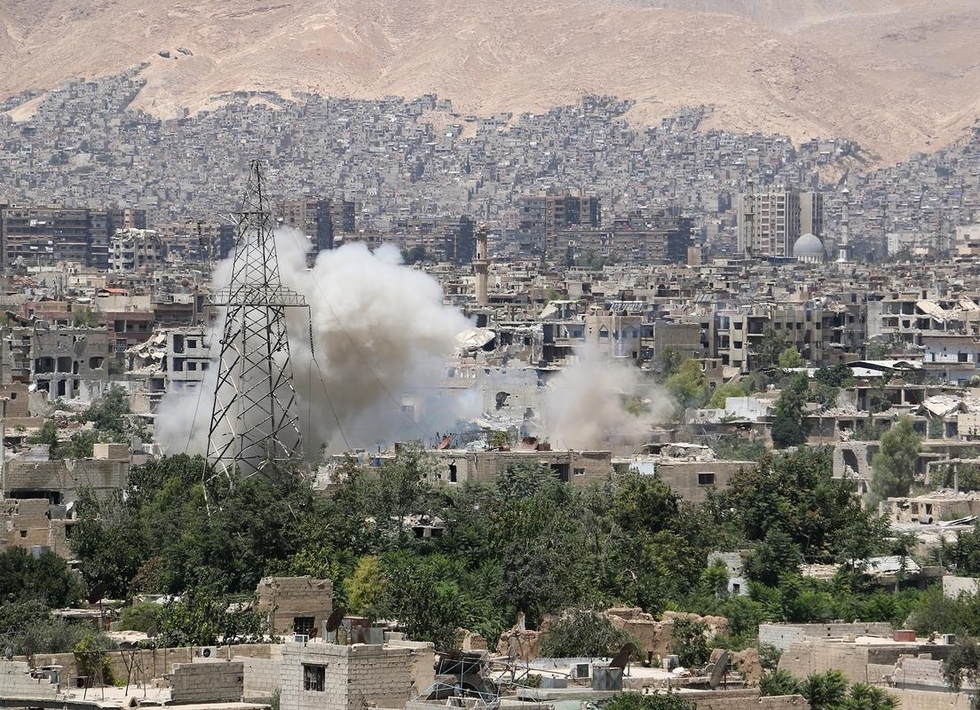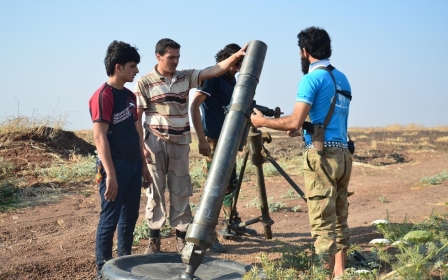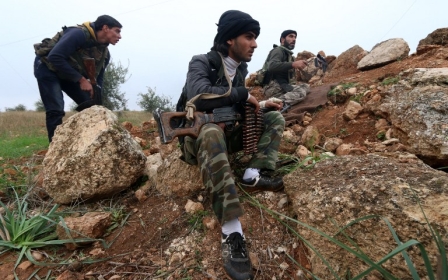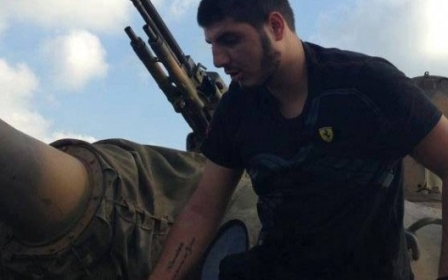Syria accused of war crimes as death toll mounts
Amnesty accuses government of indiscriminate attacks on civilians on same day dozens killed in Eastern Ghouta district near Damascus

Smoke rises after a missile attack of a Syrian opposition group on forces loyal to Bashar al-Assad'S government in Damascus, Syria on 8 August 2015 (AA)
Published date: 12 August 2015 13:31 BST
|
Last update: 8 years 8 months ago
Amnesty International on Wednesday accused the Syrian government of committing war crimes against civilians trapped in a besieged rebel-held area near Damascus even as monitors said that at least 37 civilians had been killed in new airstrikes targeting towns and villages in the region.
The Syrian Observatory of Human Rights said that 120 people had also been injured in the bombings which hit the towns of Douma, Saqba, Kafr Batna and Hammouriyeh in Eastern Ghouta, a rebel stronghold region outside the capital.
Residents of Eastern Ghouta have endured a near-two-year siege imposed by the Syrian government, compounded by severe restriction of movement, aerial bombardment, and “unlawful killing” - actions that according to Amnesty amount to war crimes.
The report described the effects of the government’s blockade of the area and accused Syria’s government of using “starvation as a weapon of war”.
“By repeatedly bombing heavily populated areas in a series of direct, indiscriminate and disproportionate attacks as well as by unlawfully besieging civilians, Syrian government forces have committed war crimes and displayed a sinister callousness towards Eastern Ghouta’s civilians,” said Said Boumedouha, the acting director of Amnesty’s Middle East and North Africa programme.
The human rights organisation said it had also documented at least 60 aerial attacks on Eastern Ghouta in the first half of 2015 that killed about 500 civilians.
“The timing and location of these attacks appear deliberately orchestrated to maximise damage or civilian casualties in a gruesome attempt by the Syrian government forces to terrorise the population,” Boumedouha said.
Caught between two hostile sides
According to the report, which also highlighted violations by the powerful opposition militia Army of Islam, 160,000 people in the region are engaged in “an agonising struggle to survive”.
Led by Zahran Alloush, Army of Islam was found to be hoarding food, carrying out arbitrary arrests of activists, and launching indiscriminate attacks.
“Widespread violations by the Syrian government do not excuse the appalling behaviour of the Army of Islam, who have also waged indiscriminate attacks, failed to protect civilians and deprived them of access to food or medical care,” Boumedouha stated.
Trapped between the regular government airstrikes, which Amnesty called “crimes against humanity,” and the dominance of Army of Islam on the ground, the residents of Eastern Ghouta suffer from a worsening humanitarian crisis, with food and medical shortages.
“Civilians of Eastern Ghouta are essentially caught in between two hostile sides vying for their own gain,” he added.
Amnesty has long called for full humanitarian access in Syria, and for the conflict to be referred to the International Criminal Court.
Rockets fired in Damascus
Also on Wednesday, armed opposition groups fired a barrage of rockets from the outskirts of the capital into the centre of the city.
The Syrian Observatory for Human Rights reported that more than 50 rockets were fired at several central neighbourhoods, killing five people - four civilians and one soldier - and injuring 59 others.
Syrian state media also reported on the incident.
“A number of citizens, including a woman were killed and others were injured… by terrorist shelling of residential neighbourhoods in Damascus,” state television said, quoting the interior ministry.
“Four people were killed and 48 others wounded, in addition to material damage.”
Ceasefire in Zabadani
Meanwhile, opposition armed groups and foreign militias supporting the Syrian government have agreed to a 48-hour truce in flashpoint towns along the border with Lebanon.
The truce went into effect at 0300 GMT in the last opposition-held mainstay on the Syrian-Lebanese border, Zabadani. A simultaneous ceasefire was held in the government-controlled villages of Fuaa and Kafraya in the northwest province of Idlib.
“The deal is between fighters from Ahrar al-Sham and local rebels on one side, and Iran and Lebanese Shia group Hezbollah on the hour,” said Rami Abdel Rahman, the director of the Syrian Observatory.
While the ceasefire has been agreed upon, Abdel Rahman told AFP negotiations were ongoing regarding the withdrawal of all rebel fighters from Zabadani, as well as a halt to the siege of Fuaa and Kafraya.
Besieged by a rebel coalition including Ahrar al-Sham, their residents are mostly from the minority Shia sect.
Pro-government forces have demanded that "food and medical supplies enter Fuaa and Kafraya," Abdel Rahman said.
Restricted ceasefires have been implemented from time to time in parts of Syria, usually in an effort to allow food and medical aid into besieged areas.
Last month, Hezbollah launched an offensive to clear Zabadani of armed opposition groups.
The rebel alliance, which calls itself the Army of Conquest, regularly fires barrages of rockets into the villages, claiming a mission to avenge the offensive on Zabadani.
Coalition airstrike 'kills children'
Meanwhile, at least 11 people including a child were reported killed in an airstrike in the northern town of Atmeh in Idlib province carried out by the US-led coalition targeting the Islamic State (IS) group and other militant groups.
The Syrian Observatory of Human Rights' Abdel Rahman said that the target of the strike had been a weapons depot belonging to the Jaish al-Sunna group, which is part of a rebel alliance that also includes the al-Nusra Front, al-Qaeda's affiliate in Syria.
Abdel Rahman said that the strikes killed 10 members of Jaish al-Sunna, in addition to a child.
Atmeh is close to a large refugee camp and Abdel Rahman said the strike was close to residential buildings.
“The strikes hit the weapons depot, but there are civilians living nearby,” he said.
But the account was challenged on social media by aid workers on the ground who said that at least two children were among the dead and four more were believed to be still buried under rubble.
One aid worker wrote on Facebook that he had helped a man pull his wife and daughter alive out of the rubble.
"I was amazed that people could come out of that wreckage alive. After that the other two children were already dead. Four more are still under the ground," he said.
Middle East Eye has not been able to verify the account.
Stay informed with MEE's newsletters
Sign up to get the latest alerts, insights and analysis, starting with Turkey Unpacked
Middle East Eye delivers independent and unrivalled coverage and analysis of the Middle East, North Africa and beyond. To learn more about republishing this content and the associated fees, please fill out this form. More about MEE can be found here.




